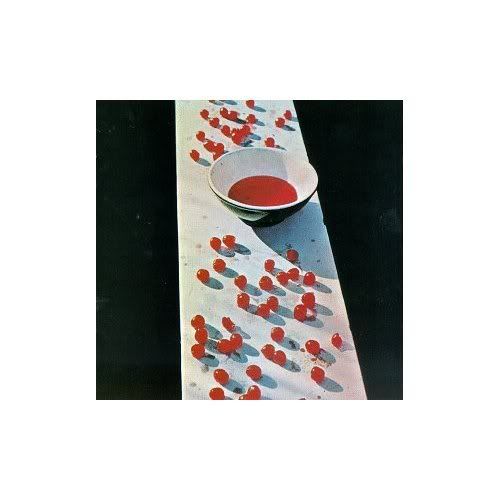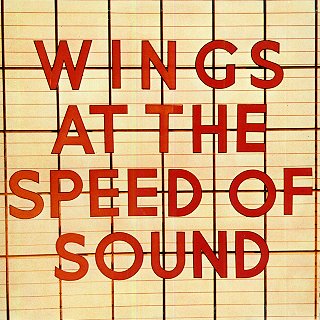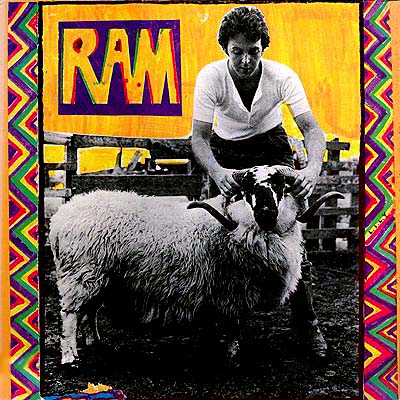With Paul McCartney's new album, Memory Almost Full,
due out the first Tuesday of June, this month seems as good a time as any to review Macca's solo career. I am a fan, not a fanatic; I'm in awe of the guy's talent, though, and find a lot of creative inspiration in his work. I don't own all of his solo albums but I own a lot of them. I'll be writing about them, in the order they were released, over the next few weeks.
Paul McCartney's first solo album, entitled
McCartney, was recorded on a home four-track, with McCartney playing all the instruments (and providing all the vocals except for some harmonies from wife Linda). It is as raw, intimate, and simple as
Abbey Road--completed during the same period--is baroque. The opening track--the brief and beautiful "The Lovely Linda,"--ends with the sound of spontaneous laughter, suggesting that the album is as much a musical diary as it is a commercial enterprise. It's a conscious choice, obviously, and a wise one that sets the tone for the album that follows.
McCartney's offhandedness can be both engaging and infuriating, depending on your willingness to indulge McCartney, who seems to have put absolutely everything he recorded on the four-track onto this album. Thus, the inclusion of "Valentine Day," an instrumental that consists of little more than a two-chord vamp accompanying a simple blues/rock solo on electric guitar; "Hot As Sun/Glasses," the former a "Flying"-style instrumental that might make a great television theme song, the latter the sound of McCartney rubbing the rims of drinking glasses to produce notes; "Oo You," a slight minor key blues/rocker; "Momma Miss America," a vaguely Eastern European sounding instrumental that would not have sounded out of place on Camper Van Beethoven's debut,
Telephone Free Landslide Victory; and "Kreen-Akrore," an instrumental named after a Brazilian Indian tribe that is mostly an excuse for McCartney to show off his ethnic drumming.
All this might seem ridiculously self-indulgent, and maybe it is, and yet this is a charming and, at times, overpowering album all the same. Several things save it. First, every one of the throwaways described above has something to recommend it: a nifty bass line, a great groove, a brilliantly conceived chord voicing, or a surprisingly innovative musical turn that reveals a great mind at work. It's almost as if, at this point in his career, McCartney was incapable of creating completely worthless crap (that wouldn't always be the case, alas). The second track, "That Would Be Something," has no right to be any good at all: it's little more than a standard blues guitar lick with McCartney singing "That would be something/That really would be something/That would be something/To meet you in the falling rain, mama/To meet you in the falling rain" over and over. But it's quite good, catching an infectious groove and riding it for nearly three minutes and not even beginning to overstay its welcome. A campfire drum-and-guitar circle could easily drag this one out for several hours.
Second is the fact that
McCartney is peppered with some knock-you-down brilliant songs. Track four, "Every Night," arrives just in time--it's the first song on the album that actually sounds like a "finished" song. It's a gorgeous love song to Linda, counterbalancing the depressing humdrum of daily life ("Every night I just want to go out, get out of my head/Every day I don't want to get up, get out of my bed") with the redemptive power of love. The song uses the minor II in the verse and the major II in the chorus to reinforce the dichotomy--that probably sounds stultifyingly technical, but when you hear it you know what it is and why it gives you that happy 'whoosh' up your spine. It's pretty much a perfect small song.
Likewise "Junk," a song about an antique store full of merchandise of questionable value. McCartney may have been thinking about this album of bits and scraps--the album includes a number of songs intended for various Beatles albums--when he came up with the song's conceit, encapsulated in the chorus "Buy, buy says the sign in the shop window/Why, why says the junk in the yard." If so, he thought enough of the album to give its theme song an achingly beautiful melody, and recognized the quality of his work well enough to reprise it as an equally lovely instrumental on track 11. This song has the same sad, quiet, meditative quality that distinguishes the many great songs on Paul Simon's solo debut album. I don't know if there's any connection there in one direction or the other, but this song for some reason reminds me a lot of "Everything Put Together Falls Apart" and "Run That Body Down." "Junk" is immediately followed by "Man We Was Lonely," another hooky little song that pits a simple sing-songy chorus against a much more sophisticated verse. It's a great example of what makes McCartney's writing so extraordinary; he's equally at home with simple and complex musical ideas and so adept at both that he can shift easily from one to another, seemingly without effort.
The crowning achievement of
McCartney, of course, is "Maybe I'm Amazed," one of the great pop love songs of the rock and roll era. There's not a lot to say about this song except that it stands up with the best songs in the Beatles' catalogue. Unlike many of the tracks on this album, which are purposefully rough, this is a fully realized recording, spare but brilliantly arranged, layering instruments as the piece progresses to build to an anthemic ending. It's nearly 4 minutes long and yet it's over all too soon, requiring an immediate second spin.
Subsequent entries to this thread will not all be this glowing, I assure you. But
McCartney is a gem--not the apotheosis of Macca's solo career (that'd be
Ram) but still damn good. It begins a period of Macca's career during which he sought to distance himself from his superstar Beatle persona and explore smaller, more personal themes, to eschew pop stardom and celebrate domesticity. In this way it's a lot more rewarding than some of the more polished Wings albums to come, albums that embrace and celebrate stardom and pop culture and lose a lot of this album's charming personal touch in the process. Seek it out if you don't have it already.
Labels: McCartney catalogue review, music








